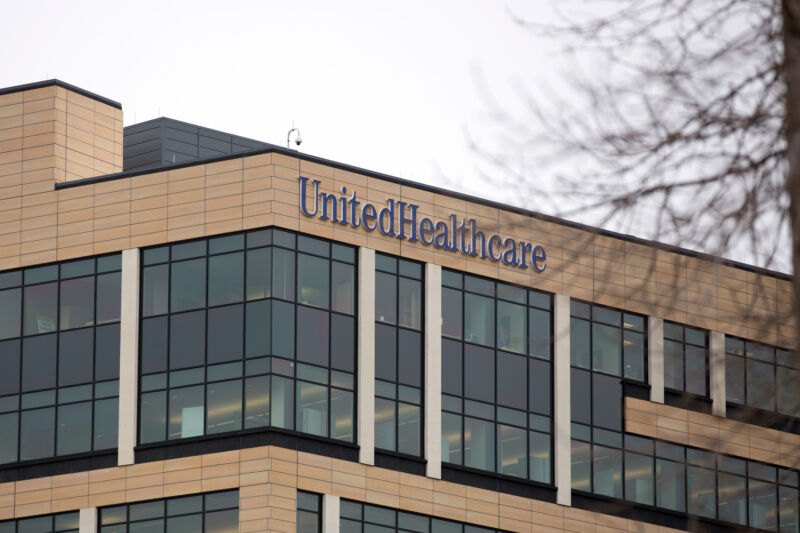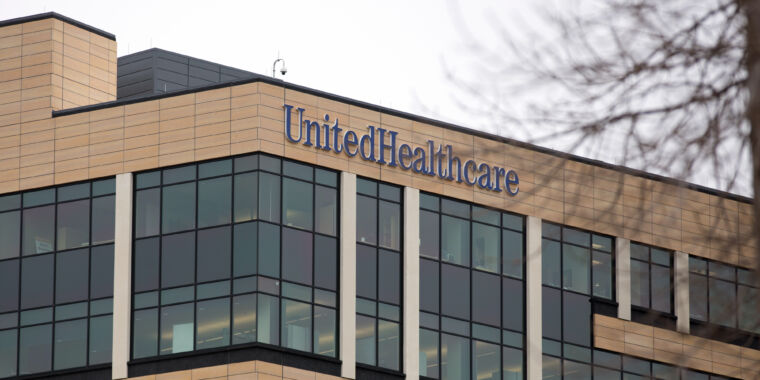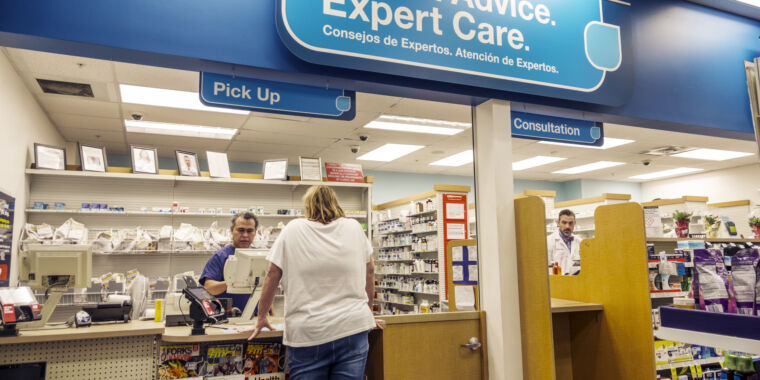Amid paralyzing ransomware attack, feds probe UnitedHealth’s HIPAA compliance
most significant and consequential incident —
UnitedHealth said it will cooperate with the probe as it works to restore services.

As health systems around the US are still grappling with an unprecedented ransomware attack on the country’s largest health care payment processor, the US Department of Health and Human Services is opening an investigation into whether that processor and its parent company, UnitedHealthcare Group, complied with federal rules to protect private patient data.
The attack targeted Change Healthcare, a unit of UnitedHealthcare Group (UHG) that provides financial services to tens of thousands of health care providers around the country, including doctors, dentists, hospitals, and pharmacies. According to an antitrust lawsuit brought against UHG by the Department of Justice in 2022, 50 percent of all medical claims in the US pass through Change Healthcare’s electronic data interchange clearinghouse. (The DOJ lost its case to prevent UHG’s acquisition of Change Healthcare and last year abandoned plans for an appeal.)
As Ars reported previously, the attack was disclosed on February 21 by UHG’s subsidiary, Optum, which now runs Change Healthcare. On February 29, UHG accused the notorious Russian-speaking ransomware gang known both as AlphV and BlackCat of being responsible. According to The Washington Post, the attack involved stealing patient data, encrypting company files, and demanding money to unlock them. The result is a paralysis of claims processing and payments, causing hospitals to run out of cash for payroll and services and preventing patients from getting care and prescriptions. Additionally, the attack is believed to have exposed the health data of millions of US patients.
Earlier this month, Rick Pollack, the president and CEO of the American Hospital Association, called the ransomware attack on Change Healthcare “the most significant and consequential incident of its kind against the US health care system in history.”
Now, three weeks into the attack, many health systems are still struggling. On Tuesday, members of the Biden administration met with UHG CEO Andrew Witty and other health industry leaders at the White House to demand they do more to stabilize the situation for health care providers and services and provide financial assistance. Some improvements may be in sight; on Wednesday, UHG posted an update saying that “all major pharmacy and payment systems are up and more than 99 percent of pre-incident claim volume is flowing.”
HIPAA compliance
Still, the data breach leaves big questions about the extent of the damage to patient privacy, and the adequacy of protections moving forward. In an additional development Wednesday, the health department’s Office for Civil Rights (OCR) announced that it is opening an investigation into UHG and Change Healthcare over the incident. It noted that such an investigation was warranted “given the unprecedented magnitude of this cyberattack, and in the best interest of patients and health care providers.”
In a “Dear Colleague” letter dated Wednesday, the OCR explained that the investigation “will focus on whether a breach of protected health information occurred and Change Healthcare’s and UHG’s compliance with the HIPAA Rules.” HIPAA is the Health Insurance Portability and Accountability Act, which establishes privacy and security requirements for protected health information, as well as breach notification requirements.
In a statement to the press, UHG said it would cooperate with the investigation. “Our immediate focus is to restore our systems, protect data and support those whose data may have been impacted,” the statement read. “We are working with law enforcement to investigate the extent of impacted data.”
The Post notes that the federal government does have a history of investigating and penalizing health care organizations for failing to implement adequate safeguards to prevent data breaches. For instance, health insurance provider Anthem paid a $16 million settlement in 2020 over a 2015 data breach that exposed the private data of almost 79 million people. The exposed data included names, Social Security numbers, medical identification numbers, addresses, dates of birth, email addresses, and employment information. The OCR investigation into the breach discovered that the attack began with spear phishing emails that at least one employee of an Anthem subsidiary fell for, opening the door to further intrusions that went undetected between December 2, 2014, and January 27, 2015.
“Unfortunately, Anthem failed to implement appropriate measures for detecting hackers who had gained access to their system to harvest passwords and steal people’s private information,” OCR Director Roger Severino said at the time. “We know that large health care entities are attractive targets for hackers, which is why they are expected to have strong password policies and to monitor and respond to security incidents in a timely fashion or risk enforcement by OCR.”
Amid paralyzing ransomware attack, feds probe UnitedHealth’s HIPAA compliance Read More »


